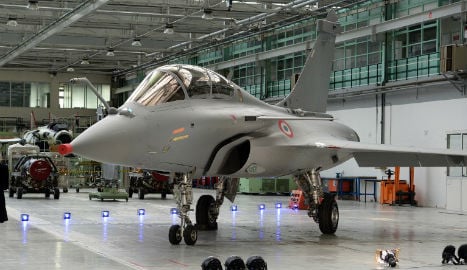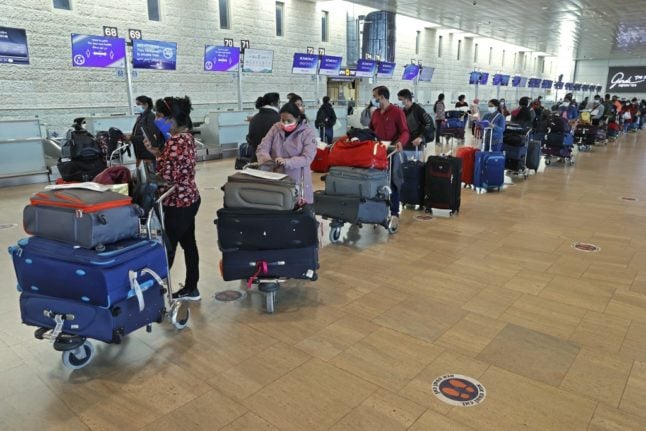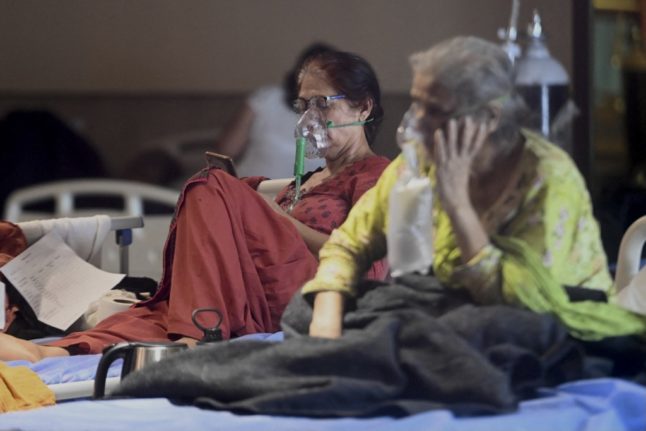INDIA
French fighter jet deal: India ‘a school of patience’
The less-than-supersonic sale of French Rafale fighter jets to India has highlighted the obstacles facing foreign arms firms seeking to do business with the world's biggest weapons importer.
Published: 25 September 2016 09:07 CEST

Rafale jets at an assembly hanger in Merignac, southwestern France. Photo: Jean-Pierre Muller/AFP
India has signed a series of key defence deals under Prime Minister Narendra Modi as part of a $100 billion upgrade of its Soviet-era military hardware, making it an attractive proposition for arms exporters.
But a series of corruption scandals have made India a challenging environment, with huge delays and a tough negotiation process.
After nearly a decade of discussions and setbacks India signed a deal Friday to acquire 36 Rafale fighter jets for 7.9 billion euros ($8.8 billion) as it seeks to bolster its military against an increasingly assertive China.
Defence experts say the aircraft, manufactured by France's Dassault, will provide a much needed boost to India's air force. But the final windfall was much less than had been hoped for by the French.
“The Indians always conduct very tough negotiations. They are known for it,” said Isabelle Saint-Mezard, a specialist in South Asian strategic issues at the University of Paris.
“They have all the major weapons suppliers knocking at their door, so they are well positioned to do so.”
Eric Trappier, CEO of Dassault Aviation, has gained experience of India's bargaining tactics in recent years. “India is a school of patience,” he said.
The country ranks 130 out of 189 on the World Bank's Ease of Doing Business index — the worst of all G20 countries — and regulations vary capriciously across its 29 states, where even the same law can be interpreted in bafflingly different ways.
Fear of corruption
Allegations of corruption have scuppered Indian defence deals as far back as 1987, when then-prime minister Rajiv Gandhi's government collapsed over charges of kickbacks paid to Indian officials by the Swedish group Bofors to clinch a $1.3-billion artillery deal.
Fears of further corruption meant that “the modernisation of the armed forces stalled,” said Gulshan Luthra of the Institute for Defence Studies and Analyses in New Delhi.
To erect safeguards against graft India ramped up its army of bureaucrats dealing with weapons sales, with contracts becoming trapped in a paper maze.
The smallest comment on an arms deal required from a government department can delay a case for several months.
“In recent years, the authorities have tried to clamp down on graft. As a result, officials in charge of issuing contracts fear exposing themselves to suspicion of corruption and are reluctant to engage,” said St. Mezard. For a contract to succeed, “it usually takes strong political will at the highest level of the state,” she added.
But all these precautions do not prevent old demons resurfacing. In 2013 the government scrapped a $748 million contract with AgustaWestland helicopters following allegations it was won through kickbacks.
Technology transfer
Deals are also complicated because India is determined to achieve its goal of being less dependent on foreign trade for its military equipment. Its tenders are accompanied by significant technology transfer requests.
For example, one mooted deal was to have seen Dassault assemble 108 out of 126 fighter jets on Indian soil.
But the French refused to assume responsibility for all the planes that were to be built in India.
“The Indians insist on such deals, but without always having the means or the expertise to carry them out. As a result, suppliers are reluctant to embark on this sort of agreement,” said St. Mezard.
Faced with an urgent need to modernise its military, Modi's government finally opted for the direct sale of 36 ready-to-fly Rafale jets, which will be manufactured in France.
But Dassault will be contractually bound to reinvest nearly half of the value of the deal in India, an obligation known as the offset clause.
“The offset rules are very complicated and opaque,” said Rahul Bedi, a Jane's Defence Weekly analyst. “We are talking high-tech and the Indian industry does not have the sophistication to absorb such offsets.”
India has signed several big-ticket deals since Hindu nationalist Modi took power in 2014.
The increasing assertiveness of its giant neighbour China as well as its simmering rivalry with Pakistan have increased its need to upgrade its military. That signals many potential contracts for foreign arms suppliers — despite the obstacles.
Url copied to clipboard!



 Please whitelist us to continue reading.
Please whitelist us to continue reading.
Member comments